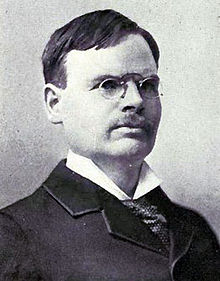William Wilfred Campbell
William Wilfred Campbell (* 1858 in Ontario , † January 1, 1918 in Ottawa ) was a Canadian writer.
Different information is given about the date and place of birth of Campbell: June 1, 1858 and the place of birth Kitchener , but also June 15, 1860 and the place of birth Newmarket . The son of the Reverend Thomas Swainston Campbell grew up in various small towns in Ontario. He attended Owen Sound High School from 1877 to 1879 and earned a teacher's certificate. From 1882 to 1882 he studied at the University College of the University of Toronto , followed by a degree in theology at Wycliff College (1882) and at the Episcopal Theological School in Cambridge .
In 1885 Campbell was ordained a deacon and received a position in West Claremont , New Hampshire ; In 1886 he was ordained as a pastor. In 1888 he became Rector of Trinity Church in St. Stephen / New Brunswick , in 1890 Rector of St. Paul's Church in Southampton / Ontario . In 1891 he got a job as a clerk at the Department of Railways and Canals in Ottawa, in 1892 he moved to the Department of the Secretary of State , the following year to the Department of Militia and Defense and in 1897 to the Privy Council Office . In 1908 he was given a position in the archives of the Department of Agriculture , which he held until his death.
Campbell's first volume of poetry appeared during his student days in 1881 ( Poems! ). Between 1881 and 1888 several poems were published in Varsity magazine . Its first publication in a major magazine (Atlantic Monthly) was Canadian Folk Song (1885). In 1888 his first volume of poems Snowflakes and sunbeams appeared , which also contained his poem Indian Summer - one of the most popular Canadian poems to this day. The next year the band Lake lyrics and other poems followed .
With Duncan Campbell Scott and Archibald Lampman , he wrote weekly columns from 1892-93 under the title At the Mermaid Inn for Globe magazine . In 1893 his next volume of poetry, The dread voyage, was published . In 1894 Campbell was inducted into the Royal Society of Canada . He became its vice-president in 1899, was president from 1900 to 1901 and secretary of Section II of the Society from 1903 to 1911. From 1895 he wrote seven verse dramas, the first two of which appeared in 1895 under the title Mordred and Hildebrand: a book of tragedies and in 1908 with two others as Poetical tragedies .
After 1900, he wrote his three novels Ian of the Orcades (1906), A beautiful rebel (1909) and Richard Frizzell (published in sequels from 1909 to 1910 in the Christian Guardian ). His patriotic sentiment and enthusiasm for the British Empire - inspired by his friendship with contemporaries such as the Duke of Argyll , Lord Gray , Nicholas Flood Davin , William Dawson LeSueur , Charles Albert Edwin Harriss and Robert Tait McKenzie - found expression in works such as Poems of loyalty by British and Canadian authors (London, 1913), The Oxford book of Canadian verse (Toronto, 1913) and Sagas of Vaster Britain (1914).
Campbell died of pneumonia on New Year's Day 1918. After his death, his popularity quickly faded. His political beliefs became unpopular, and his traditional literary production lagged behind the works of contemporaries such as Charles George Douglas Roberts , William Bliss Carman , Duncan Campbell Scott and Archibald Lampman .
Works
- Snowflakes and sunbeams , 1888
- Lake lyrics and other poems , 1889
- The dread voyage: poems , 1893
- Beyond the hills of dream , 1899
- Ian of the Orcades; or, the armourer of Girnigoe , 1906
- The collected poems of Wilfred Campbell , 1905 (with illustrations by Thomas Mower Martin 1907)
- Poetical tragedies , 1908
- A beautiful rebel: a romance of Upper Canada in eighteen hundred and twelve , 1909
- The beauty, history, romance and mystery of the Canadian lake region , 1910
- The Scotsman in Canada , 1911
- Sagas of Vaster Britain; poems of the race, the empire and the divinity of man , 1914
swell
- Dictionary of Canadian Biography - Campbell, William Wilfred
- William Wilfred Campbell: "Selected Poetry and Essays" , Wilfrid Laurier Univ. Press, 1987, ISBN 9780889209602
- The Canadian Encyclopedia - William Wilfred Campbell
- Canadian Poetry - William Wilfred Campbell
- Canadian Poetry - Confederation Voices: Seven Canadian Poets - VI - William Wilfred Campbell
- Poets' Pathway - William Wilfred Campbell
- University of Toronto Libraries - Campbell, William Wilfred
| personal data | |
|---|---|
| SURNAME | Campbell, William Wilfred |
| BRIEF DESCRIPTION | Canadian writer |
| DATE OF BIRTH | June 1, 1858 or June 15, 1860 |
| PLACE OF BIRTH | Kitchener or Newmarket |
| DATE OF DEATH | January 1, 1918 |
| Place of death | Ottawa |
